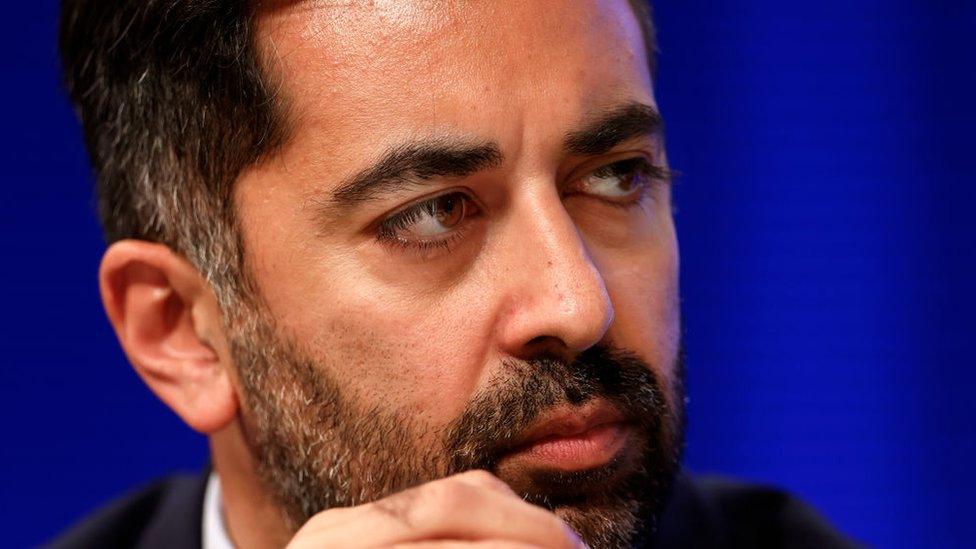Who is Humza Yousaf? The rise and fall of a former first minister
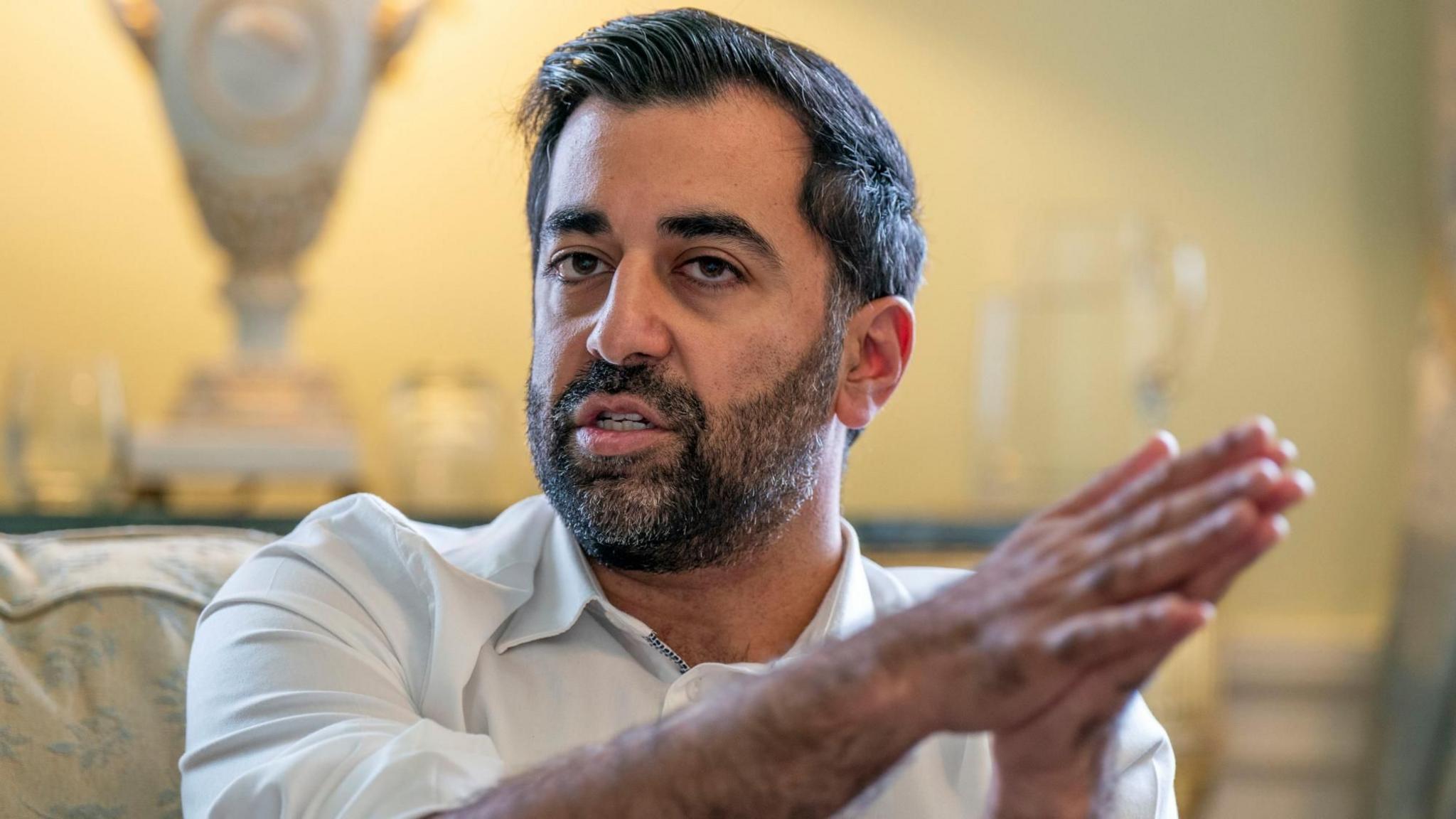
Humza Yousaf became Scotland's first minister in March 2023
- Published
Humza Yousaf's decision to leave the Scottish Parliament in 2026 brings to an end a political career that both broke the mould and ended in failure.
He was the first person of colour to hold the office of first minister and the first Muslim to lead a western nation.
But his resignation in April after just 13 months in Bute House was a swift and brutal fall that left the SNP in a terrible position just months ahead of the General Election.
His immediate political legacy could be seen as the 39 seats his party lost at Westminster in July.
When he ran for first minister in March 2023, Yousaf was seen as the continuity candidate and the natural heir to Nicola Sturgeon's vision for Scotland.
He was widely touted as her preferred choice, although she did not endorse any of the three candidates.
But after ending the Bute House Agreement which she had struck with the Scottish Greens and which was key to that vision, his time in office was quickly over.
The 39-year-old has spent his entire career working for and representing the SNP and as he announced his departure he said he will continue to fight for independence from outside the parliament.
Humza Yousaf - family, education, career
In many ways, Yousaf's career reflected modern Scotland and the modern SNP, a party which has spent decades building support among the country's ethnically and religiously diverse communities.
His Pakistani father emigrated to Scotland with his family in the 1960s. His mother was born into a South Asian family in Kenya. Yousaf has often spoken of the racist abuse he has received throughout his life.
He was educated at the private Hutchesons' Grammar school in Glasgow, then studied politics at Glasgow University.
In a 2018 interview with Holyrood, external magazine, he spoke of his decision to study and become active in politics.
"My dad, who really had so much foresight, said that we were living at a time when we needed more representation and we didn’t really have anything," he said.
"He was the one that said I should go into politics. I did say at the time that I just enjoyed the research and I wanted to do background stuff rather than being a front-line politician, but he said, ‘goodness knows where it will take you but follow your heart’."
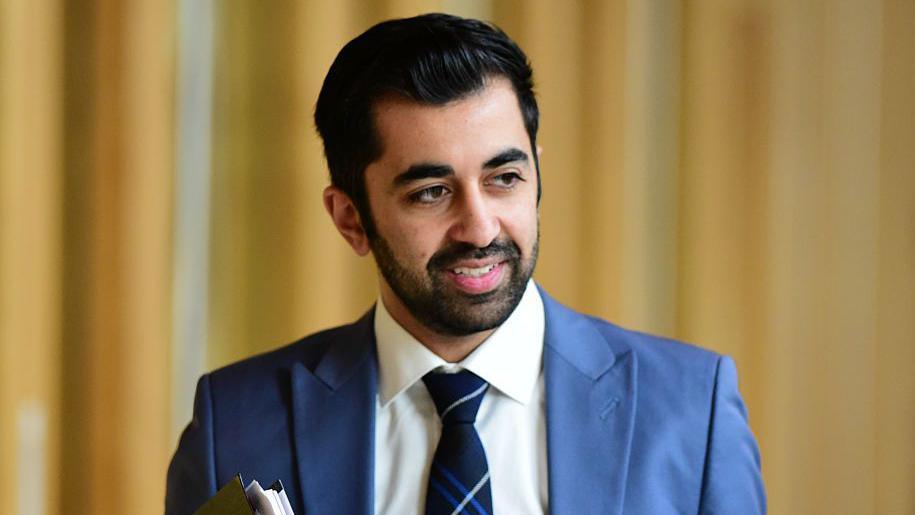
Yousaf was appointed transport secretary in 2016
He joined the SNP while a student, inspired, he said, by hearing Alex Salmond speaking out against the Iraq war.
Immediately after graduating he began working as an assistant to Bashir Ahmad, the first Muslim and first person of colour to be elected as an MSP.
Yousaf went on to work for both Salmond and Sturgeon before winning a list seat in the 2011 election.
He was 26 and, at the time, one of the youngest MSPs ever elected.
His rise through the ranks was swift. After a year he was promoted to minister for Europe and international development.
He became transport minister in 2016 after taking Glasgow Pollok from Labour, the first ethnic minority candidate to win a constituency seat.
The corridors of power
But his record as a minister was mixed and the criticism he often faced would be used against him when he became first minister.
He was attacked over the performance of ScotRail after operators Abellio took over the contract to run the franchise, a move which ultimately led to it being nationalised.
After his promotion to the cabinet in 2018 as Sturgeon's new justice secretary, his flagship hate crime bill was mired in controversy over fears that the new offence of "stirring up hatred" could have a major impact on freedom of speech.
Yousaf was also criticised for tweeting about his "disgust" over a video supposedly showing Rangers players using sectarian language that quickly turned out to be fake.
And he dismissed concerns about the state of Scotland's police buildings as "hyperbole" just hours before the ceiling collapsed at Broughty Ferry police station near Dundee. Yousaf had recently moved to the town.
Within three weeks of becoming health secretary in May 2021, Yousaf had to apologise for any "undue alarm" he had caused by wrongly claiming that 10 children had been hospitalised "because of Covid".
His supporters, however, pointed to achievements across his time in government, including delivering the Queensferry Crossing on time and under budget and falling crime figures.
One video from that period came to haunt him. He was caught on camera falling off a knee scooter that he was using to speedily navigate the corridors of Holyrood while recovering from rupturing his Achilles tendon playing badminton.
When video of his tumble was tweeted by BBC Scotland political editor Glenn Campbell, Yousaf replied: "If anyone else had fallen over while on crutches, a knee scooter, or in a wheelchair would your first instinct be to film it & tweet out?"
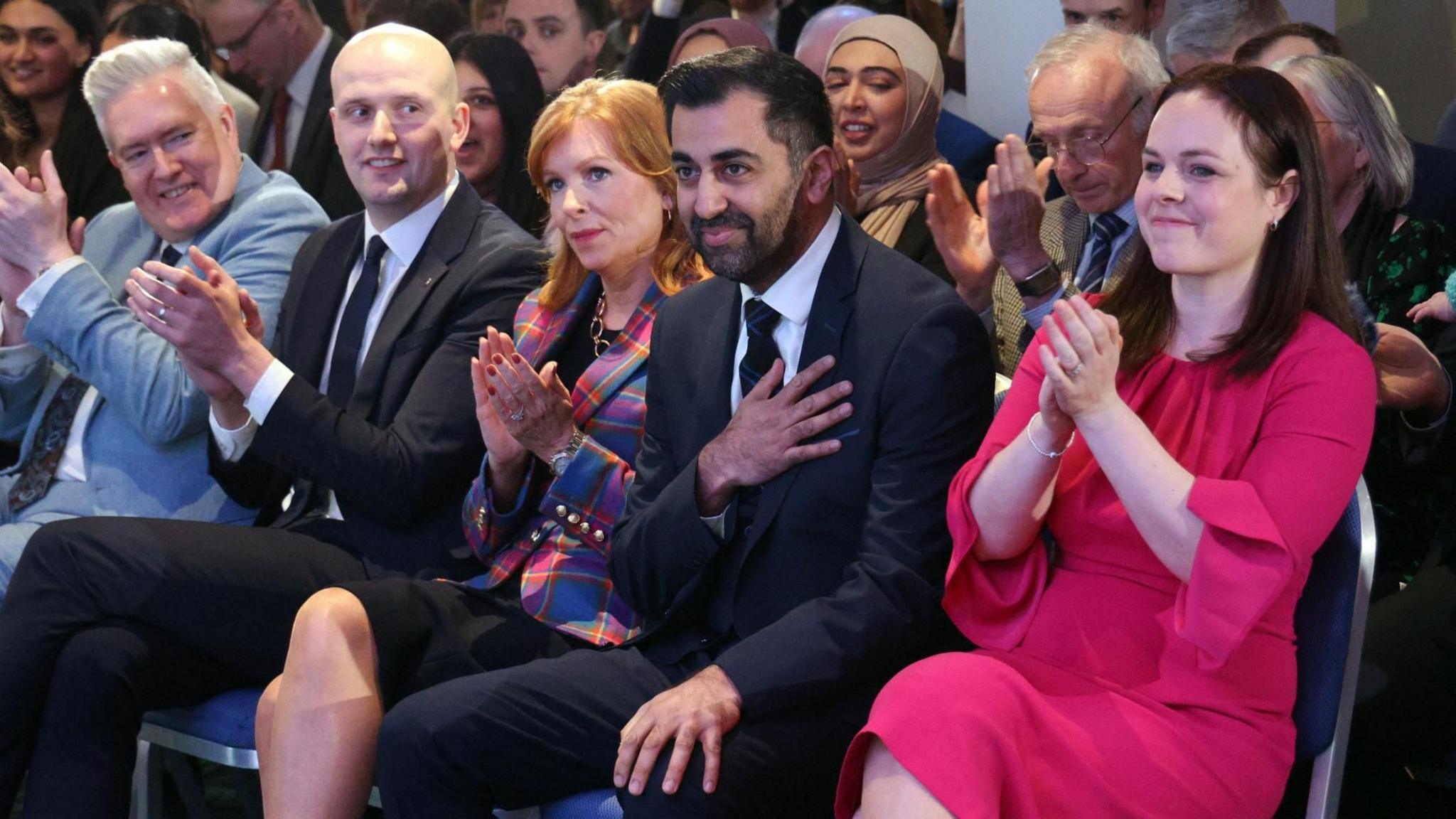
Yousaf won the SNP leadership contest in 2023
When Sturgeon announced in February 2023 that she was standing down as first minister, Yousaf was seen as the candidate who would continue her work.
He was the only contender to say he would challenge the UK government's block on Sturgeon's controversial gender recognition reforms in the courts, arguing that independence would only be won if the party continued to push "progressive values".
He was also the only candidate to say he would continue the partnership agreement with the Greens.
His margin of victory – he defeated Kate Forbes by 52% to 48% in the final round of voting – was narrower than some had predicted.
Just days after he was sworn in, police searched the home of Sturgeon and her husband Peter Murrell, as well as the SNP's headquarters in Edinburgh, as part of the Operation Branchform investigation into the party's funding and finances.
Both were later arrested and released without charge pending further investigations.
Mr Murrell was later re-arrested and charged in connection with the embezzlement of funds from the SNP.
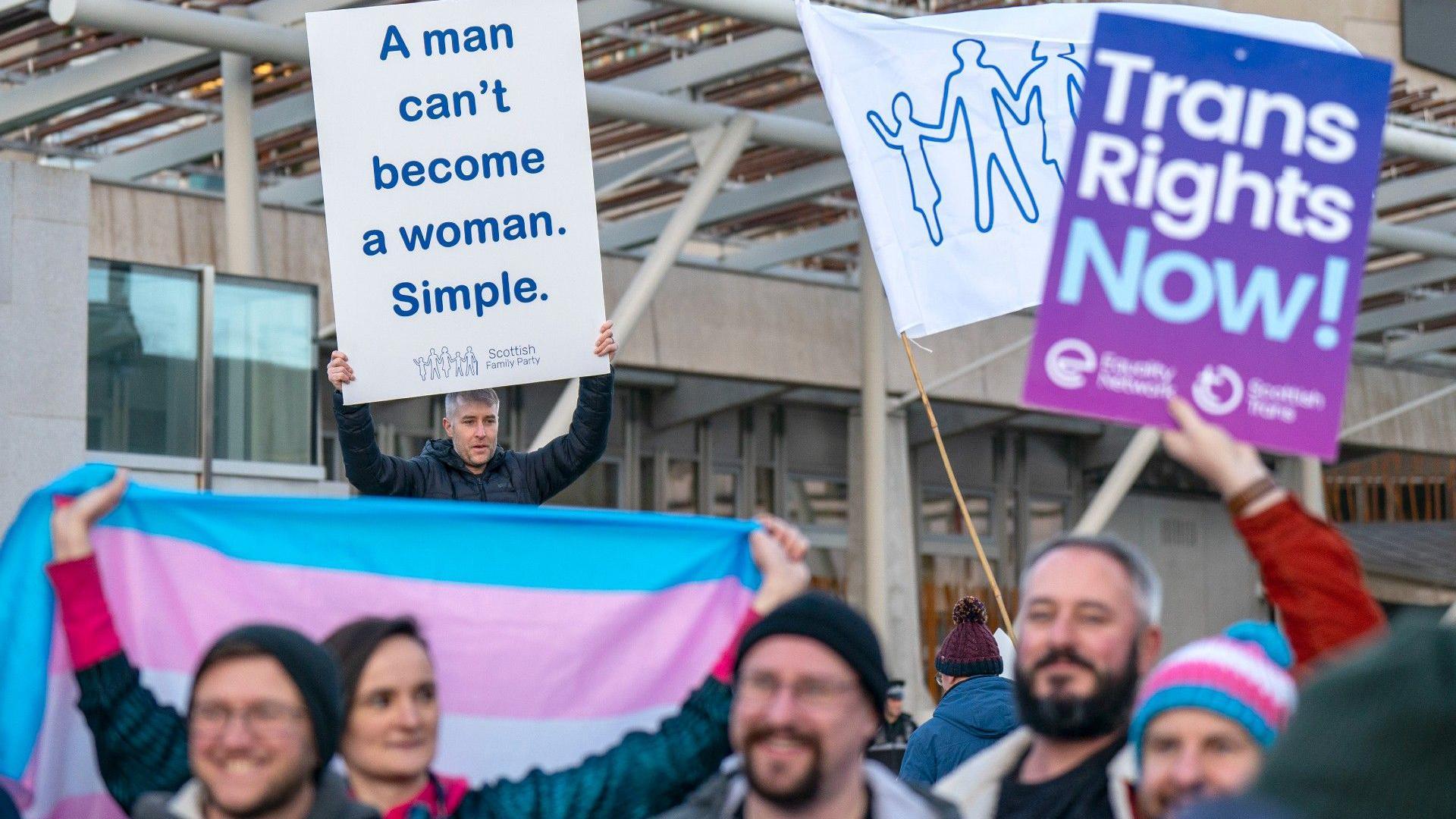
The gender recognition reforms proved controversial
Yousaf’s year as first minister saw the postponement of a controversial deposit return scheme, which had been led by the Greens.
Proposals for highly protected marine areas were also ditched.
The Scottish government did go to the Supreme Court to challenge the UK government's block on the gender recognition reforms – but lost the case, leading to the legislation being shelved.
Labour comfortably won the Rutherglen by-election in October 2023 with a 20% swing from the SNP.
Yousaf took a significant early stand on the conflict in Gaza by calling for an immediate ceasefire.
His in-laws were trapped in Gaza for four weeks after the Israeli invasion, which followed the deadly attacks by Hamas.
Yousaf described them as being the most difficult weeks of his life.
But he faced fresh controversy at the start of this month when the hate crime laws which he had instigated as justice secretary came into effect.
Critics claimed the legislation could harm free speech, although the government insisted that it provided protection without stifling individual expression.
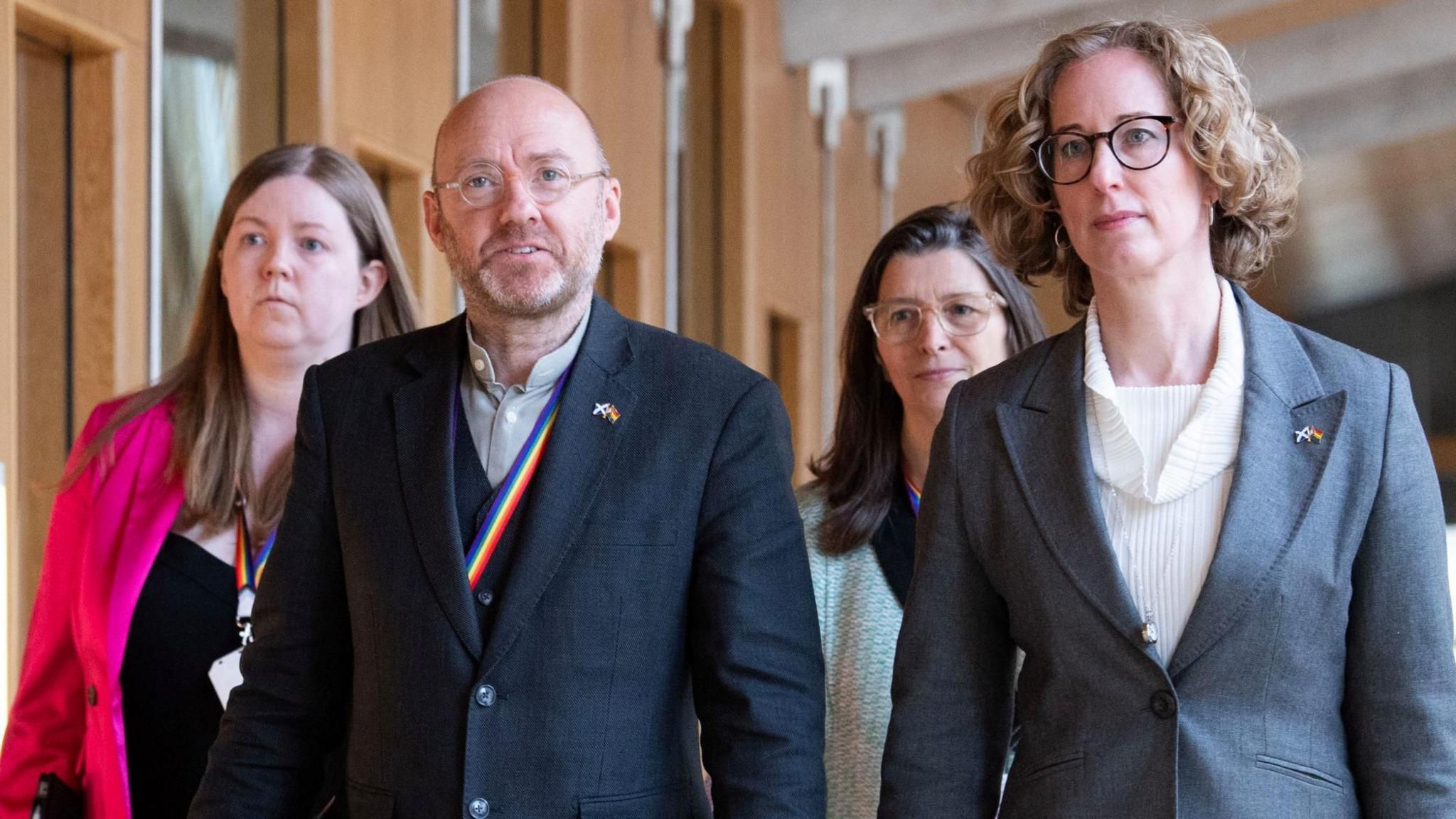
The Scottish Greens were angered by the ending of the power-sharing agreement
However, it was the decision to abandon a major part of Nicola Sturgeon's legacy – the power-sharing agreement with the Scottish Greens – that led to his downfall.
In April, the government dropped a 2030 climate target, and the Scottish NHS decided to pause the prescription of new puberty blockers to young trans people.
This angered many within the Scottish Greens, whose members demanded a vote on whether to continue the partnership.
Yousaf stressed that he “really valued” having the Greens in government – but within days called the party’s co-leaders to an early morning meeting at Bute House, where he ended the power-sharing agreement.
Yousaf and his team appeared surprised by the vehemence of the Greens' reaction. He struggled to take control of events, saying he had not meant to upset or anger his former partners.
But as they made clear it was Mr Yousaf who had to go, and as his colleagues made it very clear that any deal with Alex Salmond and Alba was out of the question, the first minister simply ran out of road.
After leaving office he welcomed a new baby daughter, spoke of his fear during the summer's race riots in England, and criticised the late Alex Salmond for his behaviour in office.
News that he is to leave Holyrood at the next Scottish election came just over a month after he had applied to stand again for election.
There was no hint of what comes next in his statement, though he spoke of his wish to spend more time with his young family.
He offered his continued support for his successor, John Swinney, pledged to continue fighting for independence and underlined his pride in speaking out in support of the people of Gaza.
- Published8 August 2024
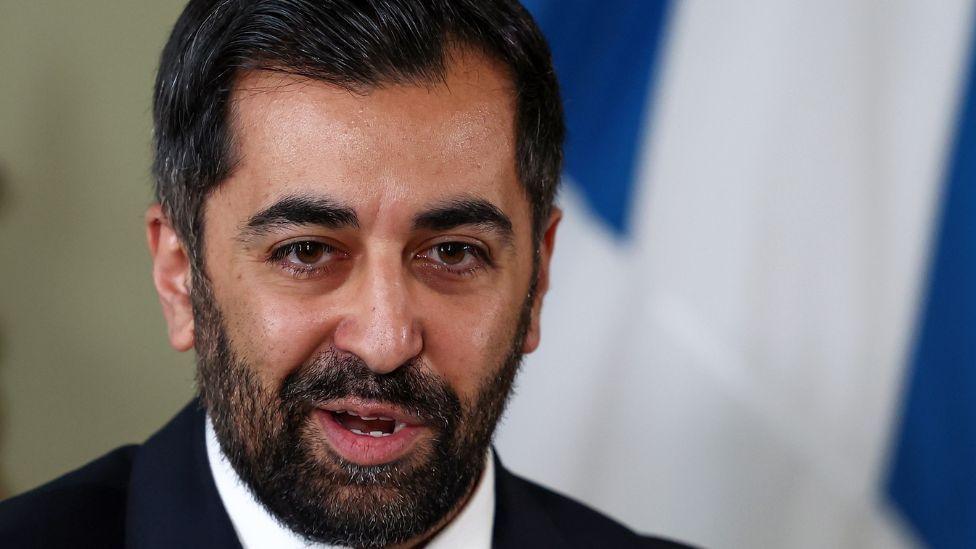
- Published7 May 2024
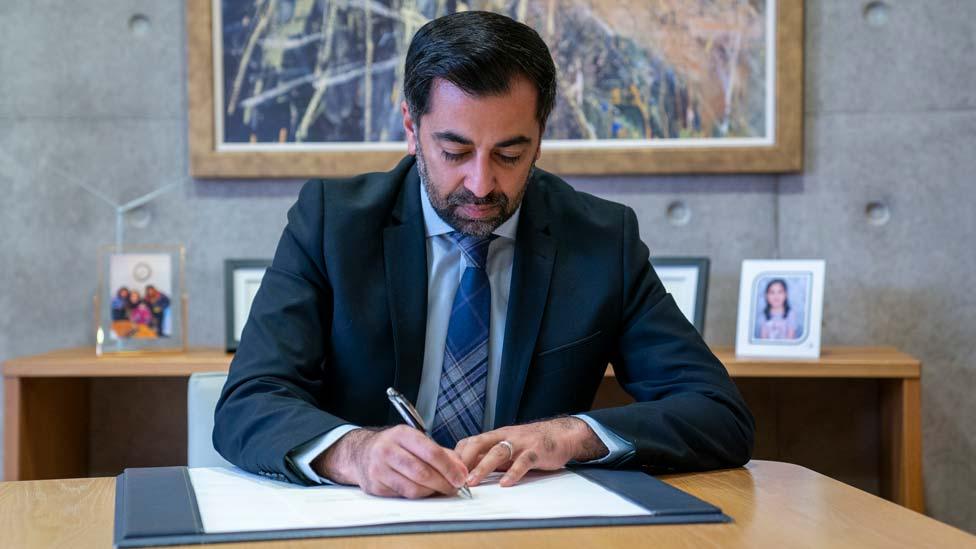
- Published29 March 2024
